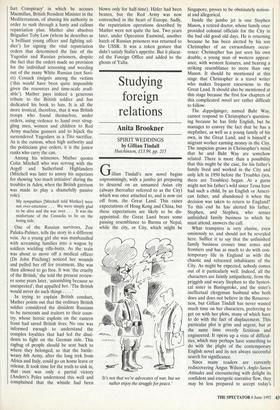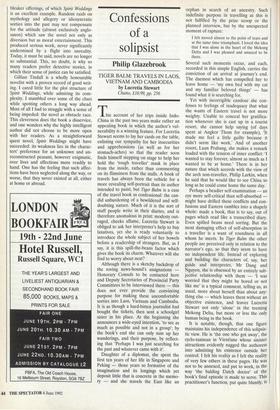Studying foreign relations
Anita Brookner
SPIRIT WEDDINGS by Gillian Tindall Hutchinson, £13.99, pp. 215 Gillian Tindall's new novel begins unpromisingly, with a jumbo jet preparing to descend on an unnamed Asian city (always thereafter referred to as the City) which was once attached to, and is now cut off from, the Great Land. This raises expectations of Hong Kong and China, but these expectations are likely to be dis- appointed: the Great Land bears some passing resemblance to Burma or Nepal, while the city, or City, which might be
'It's not that we're advocates of war, but we rather enjoy the struggle for peace.' Singapore, proves to be obstinately notion- al and allegorical.
Inside the jumbo jet is one Stephen Mason, a retired doctor, whose family once provided colonial officials for the City in the bad old good old days. He is returning because he has been alerted by his son Christopher of an extraordinary occur- rence: Christopher has just seen his own double, a young man of western appear- ance, with western features, and bearing a striking resemblance to more than one Mason. It should be mentioned at this stage that Christopher is a travel writer who makes frequent excursions to the Great Land. It should also be mentioned at this stage because the first few chapters of this complicated novel are rather difficult to follow.
The doppelgiinger, named Baht Way, cannot respond to Christopher's question- ing because he has little English, but he manages to convey the fact that he has a stepfather, as well as a young family of his own, in the Great Land, and is himself a migrant worker earning money in the City. The suspicion grows in Christopher's mind that he and Baht Way are somehow related. There is more than a possibility that this might be the case, for his father's family lived and worked in the City and only left in 1950 before the Troubles (yes, there are Troubles) began. At a guess might not his father's wild sister Tessa have had such a child, by an English or Ameri- can father, and abandoned it when the decision was taken to return to England? To this end he has alerted his father, Stephen, and Stephen, who senses unfinished family business to which he must attend, answers the call.
What transpires is very elusive, even ominously so, and should not be revealed here. Suffice it to say that the unfinished family business crosses time zones and frontiers and has as much to do with con- temporary life in England as with the chaotic and relocated inhabitants of the City. As might be expected, nobody comes out of it particularly well. Indeed, all the characters are faintly antipathetic, from the priggish and weary Stephen to the hysteri- cal sister in Basingstoke, and the sister's ineffectual clergyman husband who both does and does not believe in the Resurrec- tion, but Gillian Tindall has never wasted much time on her characters, preferring to get on with her plots, many of which have to do with the fact of displacement. This particular plot is grim and urgent, but at the same time overtly fictitious and engineered. It opens up a vista of difficul- ties, which may perhaps have something to do with the plight of the contemporary English novel and its not always successful search for significance.
Since many readers are currently rediscovering Angus Wilson's Anglo-Saxon Attitudes and encountering with delight its confident and energetic narrative flow, they may be less prepared to accept today's
bleaker offerings, of which Spirit Weddings is an excellent example. Random raids on mythology and allegory or idiosyncratic sorties into the past may not compensate for the attitude (almost exclusively anglo- saxon) which saw the novel not only as diversion but as moral entertainment. This produced serious work, never significantly undermined by a flight into unreality. Today, it must be said, novels are no longer so substantial. This, no doubt, is why so many readers prefer detective stories, in which their sense of justice can be satisfied.
Gillian Tindall is a wholly honourable novelist with a proven record of good writ- ing. I cared little for the plot structure of Spirit Weddings, while admiring its com- plexity. I stumbled over some of the clues while spotting others a long way ahead. Most of all I had to struggle with a sense of being impeded: the novel as obstacle race. This cleverness does the book a disservice, and one wonders why the highly intelligent author did not choose to be more open with her readers. As a straightforward quest novel, Spirit Weddings might have succeeded: its weakness lies in the charac- ters' preference for an unknown and un- reconstructed peasant, however enigmatic, over lives and affections more readily to hand. One has the feeling that such affec- tions have been neglected along the way, or worse, that they never existed at all, either at home or abroad.



































































 Previous page
Previous page